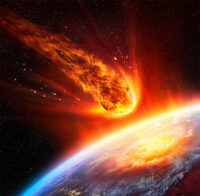When it comes to promoting planetary health, Homo Sapiens resembles the dieter who eats his daily pint of Cherries Garcia, but – sustainably! – adds only one scoop of whipped cream instead of two, and puts a paper straw in his Big Gulp.
Nonetheless, we’ve convinced ourselves we can act in time to save the planet. “In time” is usually “by 2050” or “by the end of the century” when, after we’re all dead and gone, it will be the grandkids’ problem, Praise Jesus.
And speaking of grandchildren. Politely avoided in serious discussions about climate change causes and cures is the population explosion that has taken place in the last 100 years – from less than two billion people planet-wide to 7.7 billion today.
The globe could probably tolerate a few million fossil-fuel addicts driving SUV’s, filling landfills, and tossing plastic into the ocean, but when 7.7 billion do it, Sustainability requires more than rinsing and re-using our Depends.
Clutching the bible of Consumerism and armed with new technologies, each wave of humans burdens the planet’s carrying capacity more than previous generations, bending the long Arc of Sustainability inexorably toward the dumpster. No one wants to spoil the Good Times by mentioning the Good Things fueling the fires of our own extinction.
Take medical advances that prevent or cure diseases that once limited the negative environmental impacts of human activity by simply killing many of them before their 10th birthday. Since Louis Pasteur invented a vaccination that eventually conquered smallpox, modern medicine continues to slay maladies that have haunted humans since Eve bought the first Apple.
As a result, newborns from Sonoma to Cofeve often live eight or nine decades instead of five or six, all the while making, selling, buying, burning, and discarding vast quantities of Stuff, all wrapped in single-use plastic. And, of course, Procreating.
Procreating equals Growth and as Wall Street insists, Growth Is Good, especially for shareholders.
And it has been good. Freed by advancing technology from 24/7 toil, we now fill superfluously longer lifespans with Experiences – i.e., fighting boredom instead of saber-tooth tigers, diphtheria, or the clap. Sure, measles is making a comeback but when it comes to depopulating a classroom, it couldn’t hold a candle to plague.
Is it too late to reverse our environment-destroying ways even if we really wanted to? Or have we evolved beyond salvation?
Consider that a single jumbo jet could now take Columbus, plus crews and cargo from all three of his ships, around the globe in business-class comfort in a fraction of the time it took him to bring syphilis to the New World. A mere 66 years after Edmund Hillary and Tensing Norgay blazed the way, thousands of experience-seekers swarm Mt. Everest annually, leaving trash (and the occasional body) on its once-remote heights. And only 60 years after settlers began moving into the lush Brazilian rainforest, they’re burning it to the ground to plant soybeans to feed China’s burgeoning population of consumers.
It can indeed be sobering to think that today’s climate calamities would be even greater had all the horrible wars of the 20th century – some still smoldering – not culled over 123 million people from the worldwide human herd. Had those unfortunate souls survived, their procreating proclivities and that of their progeny could by now have easily added another billion ravenous consumers (give or take) to an overburdened planet already sliding toward the abyss.
The conclusion seems unavoidable. If world peace ever breaks out, we’re all doomed.




Be First to Comment